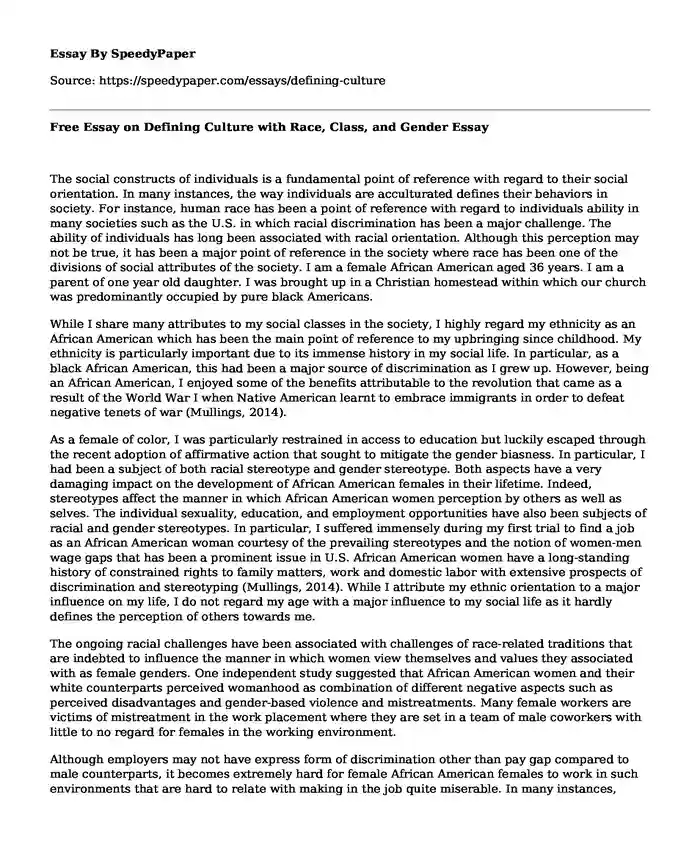The social constructs of individuals is a fundamental point of reference with regard to their social orientation. In many instances, the way individuals are acculturated defines their behaviors in society. For instance, human race has been a point of reference with regard to individuals ability in many societies such as the U.S. in which racial discrimination has been a major challenge. The ability of individuals has long been associated with racial orientation. Although this perception may not be true, it has been a major point of reference in the society where race has been one of the divisions of social attributes of the society. I am a female African American aged 36 years. I am a parent of one year old daughter. I was brought up in a Christian homestead within which our church was predominantly occupied by pure black Americans.
While I share many attributes to my social classes in the society, I highly regard my ethnicity as an African American which has been the main point of reference to my upbringing since childhood. My ethnicity is particularly important due to its immense history in my social life. In particular, as a black African American, this had been a major source of discrimination as I grew up. However, being an African American, I enjoyed some of the benefits attributable to the revolution that came as a result of the World War I when Native American learnt to embrace immigrants in order to defeat negative tenets of war (Mullings, 2014).
As a female of color, I was particularly restrained in access to education but luckily escaped through the recent adoption of affirmative action that sought to mitigate the gender biasness. In particular, I had been a subject of both racial stereotype and gender stereotype. Both aspects have a very damaging impact on the development of African American females in their lifetime. Indeed, stereotypes affect the manner in which African American women perception by others as well as selves. The individual sexuality, education, and employment opportunities have also been subjects of racial and gender stereotypes. In particular, I suffered immensely during my first trial to find a job as an African American woman courtesy of the prevailing stereotypes and the notion of women-men wage gaps that has been a prominent issue in U.S. African American women have a long-standing history of constrained rights to family matters, work and domestic labor with extensive prospects of discrimination and stereotyping (Mullings, 2014). While I attribute my ethnic orientation to a major influence on my life, I do not regard my age with a major influence to my social life as it hardly defines the perception of others towards me.
The ongoing racial challenges have been associated with challenges of race-related traditions that are indebted to influence the manner in which women view themselves and values they associated with as female genders. One independent study suggested that African American women and their white counterparts perceived womanhood as combination of different negative aspects such as perceived disadvantages and gender-based violence and mistreatments. Many female workers are victims of mistreatment in the work placement where they are set in a team of male coworkers with little to no regard for females in the working environment.
Although employers may not have express form of discrimination other than pay gap compared to male counterparts, it becomes extremely hard for female African American females to work in such environments that are hard to relate with making in the job quite miserable. In many instances, employee turnover involving female African American workers was a major challenge in most companies in the last decade though the problem persists at a relatively lower level (Mullings, 2014). Mistreatments among female colleagues culminate into mistrusts in the work environment and anger. Human race, tribe and languages often define the social context of individuals that often determine their relationship with other. This is a major challenge in areas or organization that has not adopted appropriate mechanisms such as uniform language in the workplaces among others.
References
Mullings, L. (2014). On our own terms: Race, class, and gender in the lives of African-AmericanWomen. Routledge.
Cite this page
Free Essay on Defining Culture with Race, Class, and Gender. (2019, Sep 20). Retrieved from https://speedypaper.net/essays/defining-culture
Request Removal
If you are the original author of this essay and no longer wish to have it published on the SpeedyPaper website, please click below to request its removal:
- Social Learning about Predators. Free Essay Example.
- Free Essay Example on NFL Diversity
- Article Analysis Essay on Literacy in Language and Mathematics
- Essay Example on Advertisment Critique: "Nike: Unlimited You"
- Paper Example on Survey on What Makes a Good Professor Using Purposive Sampling
- Free Essay Example: Budgeting
- Essay Sample on Conservation Ecology
Popular categories





